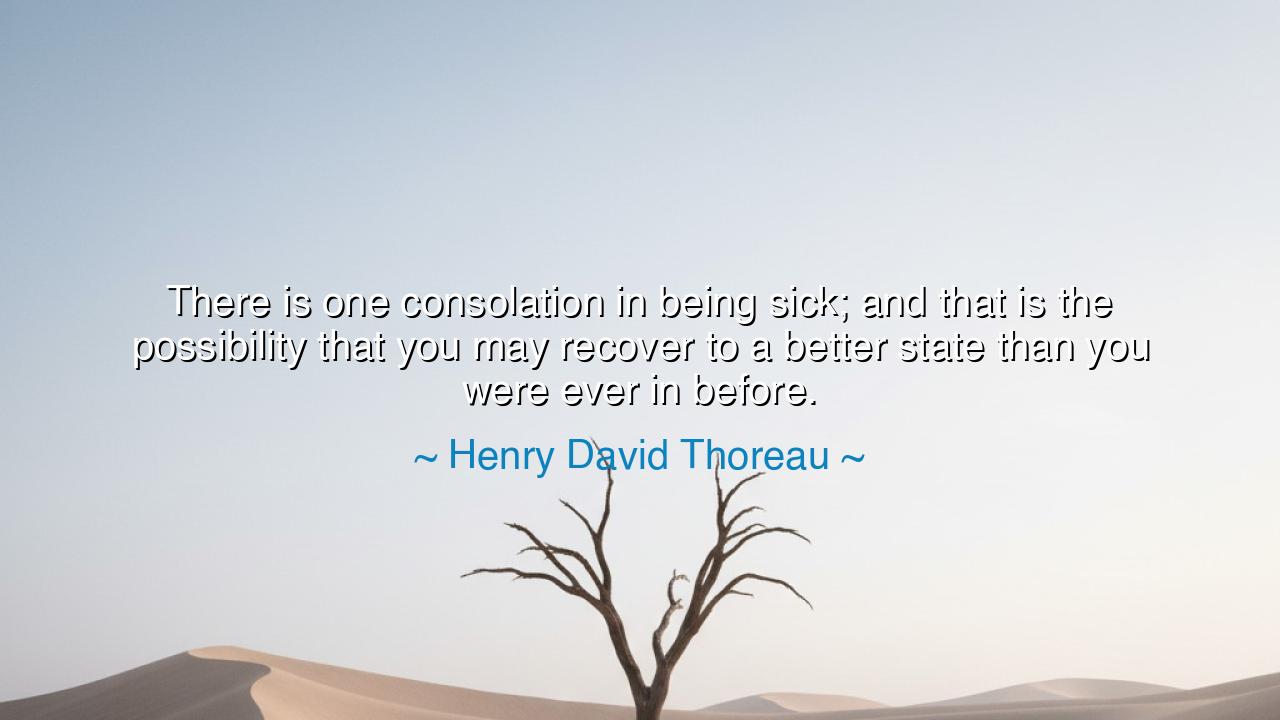
There is one consolation in being sick; and that is the
There is one consolation in being sick; and that is the possibility that you may recover to a better state than you were ever in before.






In the reflective and timeless words of Henry David Thoreau, philosopher of the woods and seeker of truth, there glimmers a light of hope for all who suffer: “There is one consolation in being sick; and that is the possibility that you may recover to a better state than you were ever in before.” These words, simple yet profound, remind us that illness is not always a curse, but can become a teacher, a purifier, even a silent rebirth. Thoreau, who lived in communion with nature and the spirit of solitude, knew that life’s hardships often hide their blessings in disguise. To be sick — in body, in heart, or in spirit — is to be stripped bare, forced to confront the essence of existence. And in that struggle lies the chance to emerge stronger, wiser, and more alive than before.
In the ancient way of seeing, every trial is an invitation to transformation. The body, when weakened, teaches humility; the mind, when shaken, learns awareness; and the soul, when burdened, discovers grace. Thoreau’s insight reflects this eternal law — that in the breaking, there is renewal. Just as a forest burns only to bloom again in richer green, so too does man, after sickness, find within himself a deeper vitality. Health regained after suffering is not the same as health never lost; it carries within it gratitude, understanding, and reverence. The one who has walked through pain cherishes the morning breeze, the warmth of sunlight, the steady beating of the heart — things once taken for granted.
Thoreau’s words were not spoken from ignorance of suffering. His own life was marked by periods of illness, both physical and emotional. Living by Walden Pond, he sought simplicity and harmony, yet his journals reveal a man wrestling with the frailty of the body and the weight of thought. He knew that sickness humbles the proud and teaches patience to the restless. But in this humility, he found hope — the belief that even from the weakest moment, a greater strength could arise. To him, the body was not the prison of the soul, but its vessel — and when tended with wisdom and rest, it could return purer, lighter, more attuned to life’s sacred rhythm.
The history of mankind bears countless echoes of Thoreau’s truth. Consider the story of Frida Kahlo, the painter of Mexico, who spent her life battling unbearable pain after a tragic accident. Bound to her bed for months at a time, she found in her suffering the spark of creation. Her art — raw, luminous, defiant — was born not from health, but from struggle. In her broken body, she discovered an unbreakable spirit. Like the phoenix of legend, she rose again and again, her flames brighter for having burned. Such is the consolation of sickness — that from the ashes of weakness, the soul may find wings it never knew it had.
The same lesson is found in nature itself, which Thoreau loved above all teachers. The tree that loses its leaves in winter does not despair; it knows that spring will return, and with it, new blossoms. The river that freezes beneath ice still flows beneath the surface, patient and persistent. So too, when sickness overtakes us, we must remember that life continues its hidden work within. Healing is not always loud or visible — it is a quiet alchemy, a renewal that begins unseen. When we rise from illness, we do not simply return to who we were; we become something greater — tempered, softened, awakened.
To live with this understanding is to find strength even in despair. When sickness comes, do not curse it, but listen. Ask what lesson it brings. Perhaps it is a call to rest, to simplify, to release what no longer serves you. Perhaps it is the body’s plea for gentleness, the soul’s whisper to begin again. The wise do not waste their pain; they transform it. Thoreau’s words remind us that even the darkest night contains the promise of dawn, and even the weakest body holds the seed of rebirth.
Let this be the teaching carried forth to future generations: sickness is not merely an interruption of life, but part of its sacred rhythm. It humbles us, purifies us, and reminds us of our dependence on the earth, on others, and on the quiet strength within. When you recover — whether from illness, heartbreak, or loss — do not simply return to your old ways. Rise renewed. Walk slower, breathe deeper, love more fiercely. Let gratitude be your medicine, and mindfulness your protection.
Thus, as Thoreau so gently teaches, find consolation even in affliction, for within every fall lies the chance to rise higher. Embrace each struggle not as punishment, but as initiation — the forging of a wiser, gentler, stronger self. For it is through sickness that we learn the preciousness of health, through suffering that we learn compassion, and through loss that we discover the unshakable truth of our own endurance. And when we stand again, having endured, we may indeed find ourselves in “a better state than we were ever in before.”






AAdministratorAdministrator
Welcome, honored guests. Please leave a comment, we will respond soon